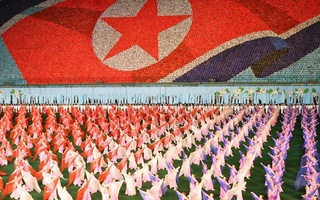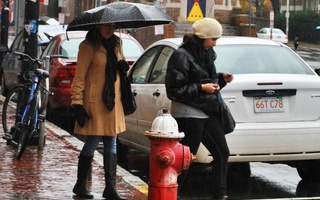In their homeland of North Korea, two sisters struggle to make the difficult decision between remaining faithful to their country or fleeing to the United States in search of a better life. Company One's production of "You For Me For You," playing at the Boston Center for the Arts’ Plaza Theatre through February 16, explores how the loving bond between two sisters can survive amidst political and personal turmoil. This new work, scripted by playwright Mia Chung, succeeds in creating a unique world through realistic and disarming sound effects, superb lighting to transition between scenes, and an insightful script that deeply explores each character's plight.
Junhee (Jordan Clark) and Minjee (Giselle Ty) cope with the dangers of communist North Korea, relying on each other to survive. Throughout the performance, the two actresses maintain a natural banter, a testament to both their acting skill and the accessible script. Ty's body language and expressions cast her convincingly in the role of an older sister in declining health—her hunched shoulders, persistent coughs, and strained voice all contribute to a believable depiction of an ill young woman.
The play highlights the struggle of Junhee in her efforts to take care of her older sister. Both Junhee and Minjee are persistent in putting the other before herself, even if that means suffering from political strife. But soon their differing opinions lead to conflict—despite unfair treatment from the North Korean government, Minjee remains steadfast, even stubborn, in her professed nationalism for her country. On the other hand, Junhee is adamant that their best and only chance for survival is to leave their home behind and travel to America. Eventually, Junhee convinces her sister that leaving home for the United States is the better option.
Chung depicts the stress of adapting to a new country while longing for home through the exaggerated speaking tropes she creates. In scenes of dialogue with the American characters Tiffany (Anna Waldron) and Wade (Johnnie McQuarley), Junhee struggles to understand English. Because of the rapid and loud nature of the Americans’ speech, it is easier to see how a foreigner may be overwhelmed by American behavior. Clark’s reserved and tacit demeanor as Junhee when she reacts to the Americans contributes to the sympathy Chung creates toward the two sisters in the play, sympathy for their alienation from American life.
Fundamental to this alienation is the feeling of an unfamiliar environment created by lighting designer Annie Wiegand and sound designer Brendan Doyle. To exaggerate the contrast between the two countries, scenes that take place in North Korea are dimmer than scenes in the United States. Not only are the lights brighter in America, but sounds, including speech, are also louder. From the first moment that Junhee arrives in the States, the sounds distinctly place the scene in a different location; she is greeted by the clamor of a bustling and noisy train station. To heighten the the sense of oppression in the North Korea setting, Doyle accompanies a tense scene in the doctor’s office with a high-pitched buzzing noise.
Again and again, Chung’s script highlights the contrasts between the two cultures. She draws attention to the characteristic consumerism of American culture with bold quips about American society—at one point Minjee says, “If you feel stress, you take a vacation that shapes your eyebrows.” Throughout the play, other characters also make blatant and occasionally snide references to aspects of American culture. The Smuggler (Michael Tow), who helps the sisters flee North Korea, serves as a stern but realistic voice to show Minjee the differences between life in the two countries. In one jab of his wry commentary, Tow references the perks of the American health care system; he remarks that the government not only provides medicine but even “pays” the sick to take time off.
“You For Me For You” is a historical and cultural lesson that not only depicts life in a closed-off society, but also tells a tale of transition that might have been overlooked by a Western audience. Even though the play centers on two North Korean sisters, the lighting and sound design, coupled with Chung’s masterful script, help an American audience feel what it might be like to experience these characters' transnational struggle. These vital aspects of the play cast the two sisters in a constantly foreign environment, unable to settle, until finally—disregarded by North Korea’s government and unable to feel connected to American culture—the two sisters find that only with each other can they truly feel at home.
—Staff writer Nzuekoh N. Nchinda can be reached at nzuekohnchinda14@college.harvard.edu.
Read more in Arts
JAMS Provide Chance to Explore ArtsRecommended Articles
-
 General Rebukes Kim Jong Il
General Rebukes Kim Jong Il -
 Behind the Bamboo Curtain: Students Hop Over to Pyongyang
Behind the Bamboo Curtain: Students Hop Over to Pyongyang -
Panel Discusses the Relationship of China and North KoreaJohn S. Park, a fellow at the Harvard Kennedy School and Senior Program Officer at the U.S. Institute of Peace, discussed China’s economic engagement with North Korea last night.
-
 Panel Evaluates North Korea
Panel Evaluates North Korea -
Students Begin 31-Hour Fast for North Korean DefectorsBeginning on Tuesday, members of Harvard Human Rights in North Korea (HRiNK) will fast for 31 hours to raise awareness about the 31 North Korean defectors recently repatriated by the Chinese government. The defectors face imprisonment, forced labor, and possible execution in their native country.
-
 The Crimson Weatherboard's Weekly Weather Review
The Crimson Weatherboard's Weekly Weather Review













